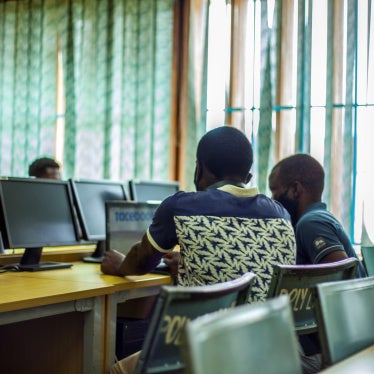This submission relates to the review of Benin under the Optional Protocol to the Convention on the Rights of the Child on the involvement of children in armed conflict, and focuses on the protection of students, teachers, and schools during armed conflict. It proposes issues and questions that Committee members may wish to raise with the government.
As of August 2017, Benin was contributing 700 troops and 19 staff officers to United Nations peacekeeping operations around the world. Such troops are required to comply with the United Nations Department of Peacekeeping Operations’ United Nations Infantry Battalion Manual (2012), which includes the provision that “schools shall not be used by the military in their operations.”[1] The majority of Benin’s peacekeeping troops are deployed in the Democratic Republic of Congo and Mali—two countries where the military use of schools has been documented by other forces. The Democratic Republic of Congo has endorsed the Safe Schools Declaration, and, as this Committee noted in 2017, has prohibited the occupation of schools by the military.[2]
Moreover, the new 2017 Child Protection Policy of the United Nations Department of Peacekeeping Operations, Department of Field Support, and Department of Political Affairs notes:
United Nations peace operations should refrain from all actions that impede children's access to education, including the use of school premises. This applies particularly to uniformed personnel. Furthermore, recognizing the adverse impact of the use of schools for military purposes, in particular its effects on the safety of children and education personnel, the civilian nature of schools, and the right to education, United Nations peace operations personnel shall at no time and for no amount of time use schools for military purposes.[3]
In June 2015, the UN Security Council unanimously adopted resolution 2225 (2015) on children and armed conflict, which:
Expresses deep concern that the military use of schools in contravention of applicable international law may render schools legitimate targets of attack, thus endangering the safety of children and in this regard encourages Member States to take concrete measures to deter such use of schools by armed forces and armed groups.[4]
Human Rights Watch believes that an example of such a concrete measure to deter the military use of schools would be for Benin to endorse and implement the Safe Schools Declaration.[5] The Safe Schools Declaration is a political commitment to better protect students, educational staff, schools, and universities during armed conflict. It was drafted through a consultative process led by Norway and Argentina in 2015. The Declaration includes a commitment to use the Guidelines for Protecting Schools and Universities from Military Use during Armed Conflict.[6]
As of October 2017, 70 countries—representing more than one-third of all UN member states—have already endorsed the Safe Schools Declaration, including 19 of Benin’s fellow African Union member states. In August 2016, the Peace and Security Council of the African Union “encouraged all Member States that have not yet done so, to sign the Safe Schools’ Declaration.”[7]
Human Rights Watch recommends that the Committee ask the government of Benin:
- What steps has Benin taken in line with UN Security Council Resolution 2143 (2014) and 2225 (2015) to deter the use of schools for military purposes?
- Are protections for schools from military use included in any policies, rules, or pre-deployment trainings for Benin’s armed forces?
Human Rights Watch recommends that the Committee call upon the government of Benin to:
- Endorse and implement the Safe Schools Declaration.
[1] United Nations Infantry Battalion Manual, 2012, section 2.13, “Schools shall not be used by the military in their operations.”
[2] Committee on the Rights of the Child, Concluding observations on the combined third to fifth periodic report of the Democratic Republic of Congo, CRC/C/COD/CO/3-5, February 28, 2017, paras. 39-40.
[3] United Nations Department of Peacekeeping Operations, Department of Field Support and Department of Political Affairs, “Child Protection in UN Peace Operations (Policy),” June 2017.
[4] United Nations Security Council, Resolution 2225 (2015), S/RES/2225 (2015), http://www.securitycouncilreport.org/atf/cf/%7B65BFCF9B-6D27-4E9C-8CD3-CF6E4FF96FF9%7D/s_res_2225.pdf (accessed October 9, 2017), para 7.
[5] Safe Schools Declaration, May 28, 2015, https://www.regjeringen.no/globalassets/departementene/ud/vedlegg/utvikling/safe_schools_declaration.pdf (accessed October 19, 2016).
[6] Global Coalition to Protect Education from Attack, Guidelines for Protecting Schools and Universities from Military Use during Armed Conflict, March 18, 2014, http://protectingeducation.org/sites/default/files/documents/guidelines_en.pdf (accessed October 19, 2016).
[7] African Union Peace and Security Council, 615th meeting, “Press statement,” August 9, 2016, http://www.peaceau.org/uploads/auc.psc.pr-615th-open-session-9august2016-1-.pdf (accessed October 9, 2017.








